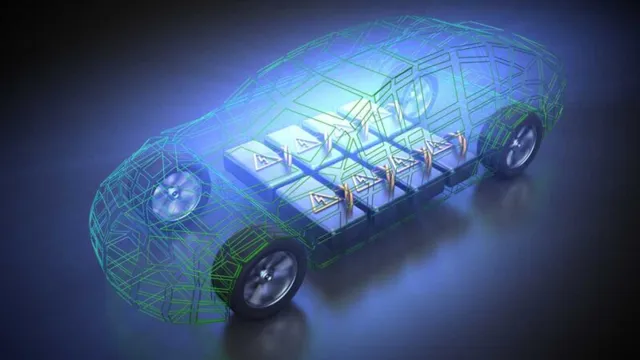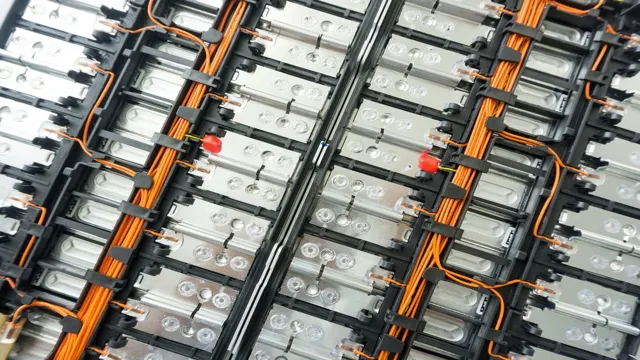Revolutionizing the Auto Industry: The Latest Electric Car Battery Cost 2019 that You Need to Know
If you’ve ever wondered what it would take for electric cars to become more affordable and accessible, one of the key factors is the cost of their batteries. In recent years, electric car battery cost has been dropping steadily, making it possible for more people to consider buying an electric vehicle. But just how much have these costs gone down in 2019? And what does it mean for the future of electric cars? Let’s take a closer look at the numbers and what they mean for you as a consumer.
Overview of Electric Car Battery Cost Trends
Electric car battery cost trends have been closely watched by industry experts and consumers alike in recent years. As of 2019, the cost of electric vehicle (EV) batteries has seen a significant drop, making EVs increasingly accessible and affordable for consumers. This trend is set to continue as battery technology advances and economies of scale in production are realized.
The improved cost-effectiveness of batteries can be attributed in large part to increased research and development in the industry, as well as government policies aimed at promoting the adoption of cleaner transportation. With electric car battery cost continuing to decline, the shift towards EVs is expected to accelerate, leading to a more sustainable transportation ecosystem. As more people opt for electric transportation, the cost of batteries is expected to drop even further, making EVs an even more attractive option for the average consumer.
Comparing 2019 Electric Car Battery Costs to Previous Years
Electric Car Battery Cost Trends Are you considering purchasing an electric car? One of the major questions on potential buyers’ minds is the cost of the battery. In 2010, the average cost of electric vehicle (EV) batteries was $1,100 per kilowatt-hour (kWh). Since then, the cost has dropped drastically, with 2019 prices averaging around $156/kWh.
This cost reduction is due to advancements in technology and increased demand for electric cars. As a result, EVs are becoming more affordable for consumers, and experts predict that prices will continue to drop, making electric cars more accessible to the general population. With lower costs and increased efficacy, it is becoming easier to consider electric vehicles as a reliable option for sustainable transportation.
Factors Affecting Electric Car Battery Cost in 2019
Electric Car Battery Cost As the world continues to transition towards more sustainable technologies, electric cars have grown in popularity, with more people choosing them as their preferred mode of transportation. A driving force behind the adoption of electric cars is the cost of batteries. Over the years, manufacturers have been working to reduce electric car battery cost to make these vehicles more accessible to the masses.
However, several factors affect the cost of electric car batteries in 2019, including raw materials, battery chemistry, and production scale. Raw materials, such as lithium, cobalt, and nickel, can account for up to 50% of the cost of electric car batteries. Moreover, the battery chemistry can also impact the cost, with some battery types more expensive to produce than others.
Finally, production scale plays a crucial role in determining the cost of batteries, with larger production runs decreasing costs due to economies of scale. All in all, the cost of electric car batteries continues to decrease as technology advances, making electric cars more affordable and accessible to everyone.
Current State of Electric Car Battery Cost
Electric car battery cost in 2019 has been declining at an impressive rate. This is mainly due to technological advancements and economies of scale brought about by increased production. According to the International Energy Agency, the battery costs dropped by 87% between 2010 and 201
That said, the cost of battery remains one of the major barriers to the wider adoption of electric cars. The good news is that electric vehicle manufacturers are working hard to reduce the costs even further. The hope is that by 2025, the price of batteries will drop to around $100/kWh, which is the point where EVs will become as cheap as traditional gasoline vehicles.
Overall, the current trend of declining battery costs is a clear indication that the future of electric vehicles is bright and full of promise.
Average Cost of Different Electric Car Models in 2019
The average cost of electric cars is gradually declining, thanks to the advancements in battery technology and the increased production of electric vehicles by major car companies. With the introduction of Tesla’s Model 3 and other models from other companies like Nissan and Hyundai, the prices of electric cars have become more affordable than ever before. According to a recent report, the average cost of electric cars was around $55,600 in 201
However, the cost of electric cars varies depending on the model and the manufacturer. The report shows that the most affordable electric car model on the market in 2019 was the Nissan Leaf, which cost around $30,000. Tesla’s Model 3, on the other hand, was the bestselling electric car in the same year, with an average price of around $47,000.
The current state of electric car battery cost indicates that while batteries still make up the bulk of an electric car’s cost, the advent of cheaper, more efficient batteries will make electric cars more affordable in the future while offering improved range and performance.
Cost Comparison between Electric and Gasoline Cars in 2019
When it comes to making a cost comparison between electric and gasoline cars in 2019, the current state of electric car battery cost cannot be ignored. Over the past decade, electric car batteries have become significantly cheaper, reducing the overall cost of electric cars. This is mainly due to advancements in battery technology and manufacturing processes.
However, electric cars are still generally more expensive to buy compared to their gasoline counterparts, but their running costs are incredibly low. A study conducted by the US Department of Energy showed that the average cost of running an electric car is only $485 per year, while a gasoline car costs around $1,117 per year. This is because electric cars have a lower cost per mile due to the cheaper cost of electricity compared to gasoline.
Overall, while electric cars may have a higher upfront cost, they offer significant savings in the long run, making them a more economical choice.
Projected Electric Car Battery Cost Changes for 2020 and Beyond
Electric Car Battery Cost Changes The market for electric vehicles has been steadily growing over the years, with more and more people opting for eco-friendly cars. However, one of the main barriers to entry for most consumers is the high cost of electric vehicles, specifically their batteries. Currently, the cost of an electric car battery can make up to 50% of the vehicle’s total cost.
With such a high price tag, it’s no surprise that the adoption rate of electric cars is still relatively low. The good news is that experts predict that electric car battery costs will continue to decline in the coming years. With advancements in battery technology and manufacturing processes, costs could potentially decrease by as much as 50% by 202
This would make electric cars more affordable for consumers and could lead to a significant boost in the market.
Tips for Reducing Electric Car Battery Cost
If you’re considering purchasing an electric car, the cost of the battery is likely a concern. Thankfully, there are several things you can do to reduce electric car battery cost in 201 First, look for incentives and rebates offered by both the federal government and your state government.
These can significantly lower the overall cost of the vehicle and the battery. Additionally, consider purchasing a used electric car or leasing a new one. This can greatly reduce the initial cost and allow you to test out the technology before committing to a full purchase.
Finally, be mindful of your driving habits and charging frequency to maximize the battery’s lifespan and avoid costly replacements. With these tips, you can save money while still enjoying the benefits of electric car technology.
Utilizing Tax Credits and Rebates
If you’re in the market for an electric car, you may be concerned about the cost of the battery. While battery costs have come down significantly in recent years, there are still ways to reduce the cost even further. One option is to take advantage of tax credits and rebates.
Many states offer significant incentives for electric car buyers, such as tax credits, rebates, and reduced registration fees. Additionally, the federal government offers a tax credit of up to $7,500 for electric car purchases. Another way to reduce battery costs is to take care of the battery properly.
This includes avoiding extreme temperatures, using the correct charging methods, and maintaining the battery’s charge level. By doing so, you can extend the battery’s lifespan and reduce the need for costly replacements. Overall, with careful planning and attention to maintenance, you can significantly reduce the cost of owning an electric car.
Maximizing Battery Life through Proper Maintenance
Maximizing Battery Life through Proper Maintenance As electric cars rapidly become more mainstream, so does the need to keep the battery in optimal condition – both for longevity and cost-effectiveness. One way to reduce electric car battery cost is through proper maintenance. This entails basic activities like keeping the battery sufficiently charged, avoiding overcharging, and performing regular maintenance checks.
Some other tips that can be employed include limiting high-speed driving to conserve energy, minimizing the use of air conditioning and heating, and avoiding rapid acceleration and braking unnecessarily. Ultimately, proper battery maintenance will keep battery life at its maximum capacity, reducing the immediate need for replacement and prolonging the life of the expensive and crucial component. By adopting these tips and using your electric car responsibly, you can save money, preserve the environment, and have peace of mind knowing that your electric vehicle will serve you for a long time.
Conclusion: Electric Car Battery Cost Prospects for the Future
In the world of electric vehicles, one thing is certain: battery costs are coming down faster than your electric bill after switching to solar panels. As advancements in technology and production methods continue to drive prices lower, the electric car revolution is finally within reach for more and more drivers. So, it’s time to say goodbye to gas-guzzling behemoths and hello to a cleaner, greener tomorrow powered by the mighty electron.
“
FAQs
What was the average cost of electric car batteries in 2019?
The average cost of electric car batteries in 2019 was around $156 per kilowatt-hour.
How much did the cost of electric car batteries decrease in 2019?
The cost of electric car batteries decreased by 13% in 2019 compared to the previous year.
Why are electric car batteries still more expensive than traditional car batteries?
The production cost of electric car batteries is still higher than that of traditional car batteries due to the high cost of the materials used, such as lithium and cobalt.
Are there any government incentives available to reduce the cost of electric car batteries?
Yes, some countries offer government incentives to reduce the cost of electric car batteries. For example, in the United States, there is a federal tax credit of up to $7,500 for the purchase of an electric car.





